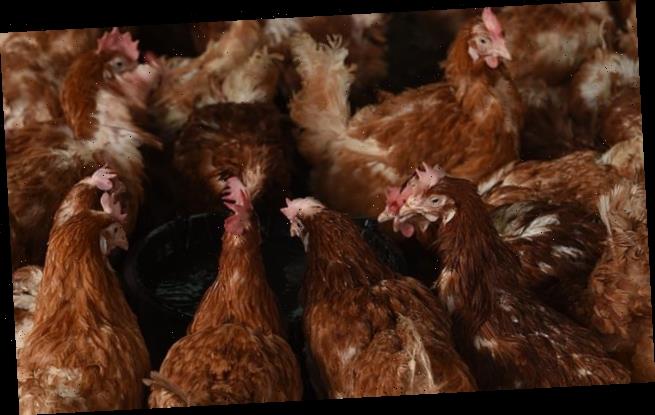Poultry chiefs say Christmas turkeys are not at risk despite cull of 27,000 chickens in first bird flu outbreak since 2017
- Cases of Bird flu confirmed at a chicken farm in Suffolk, the Government has said
- All 27,000 birds at the commercial farm were slaughtered to prevent any spread
- Numerous birds found found to have H5 strain of avian flu, according to DEFRA
- One-kilometre exclusion zone around farm to limit risk of the disease spreading
Poultry chiefs have said Christmas turkeys are not at risk of bird flu, despite the slaughter of 27,000 chickens following the first confirmed outbreak since 2017.
Farmers were urged to remain alert for signs of avian flu following the confirmed case near Suffolk, but Christmas turkey supplies are unaffected, industry leaders said.
The Department for Environment, Food and Rural Affairs (Defra) confirmed a number of chickens at a farm in Eye were infected with the H5 strain of avian flu on Tuesday, sparking concerns of a potential widespread crisis.
Poultry farmers have been put on alert (Joe Giddens/PA)
But the strain has been identified as ‘low pathogenic avian flu’, and Public Health England said today that the risk to public health is very low, while food safety is not as risk according to the Food Standards Agency.
The British Poultry Council (BPC) said it was working closely with Defra to monitor and limit the risk of the disease spreading.
BPC chief executive Richard Griffiths said: ‘The health of our birds remains the priority for BPC member businesses up and down the country.
A detailed investigation is under way to determine the most likely source of the outbreak (pictured, the Department for Environment and Rural Affairs which investigates matters such as this)
‘I would like to urge all commercial and non-commercial producers to maintain effective bio-security on their premises, remain alert for any signs and report suspected disease immediately.’
A BPC spokeswoman added: ‘There is no link whatsoever to the Christmas turkey market. It is unaffected by this case.
‘This is a specific farm in Suffolk and the birds are being culled.’
A one-kilometre exclusion zone has been set up around the farm to limit the risk of the disease spreading.
Chief Veterinary Officer Christine Middlemiss said: ‘Bird keepers should remain alert for any signs of disease, report suspected disease immediately and ensure they are maintaining good biosecurity on their premises.
‘We are urgently looking for any evidence of disease spread associated with this strain to control and eliminate it.’
Dr Gavin Dabrera, public health consultant at Public Health England, added: ‘Avian flu (often called bird flu) is primarily a disease of birds and the risk to the general public’s health is very low.
‘As a precaution, we are offering public health advice and antivirals to those who had contact with the affected birds, as is standard practice.’
A detailed investigation is under way to determine the most likely source of the outbreak.
What is bird flu? Infectious type of influenza that spreads among birds and can In rare cases affect humans
Bird flu, or avian flu, is an infectious type of influenza that spreads among birds. In rare cases, it can affect humans.
There are lots of different strains of bird flu virus. Most of them don’t infect humans.
Bird flu can be spread however by close contact with an infected bird (dead or alive).
This includes touching infected birds, touching droppings or bedding or killing or preparing infected poultry for cooking.
You can’t catch bird flu through eating fully cooked poultry or eggs, even in areas with an outbreak of bird flu.
The main symptoms of bird flu can appear very quickly and include a very high temperature or feeling hot or shivery, aching muscles, a headache and a cough.
It usually takes 3 to 5 days for the first symptoms to appear after you’ve been infected.
Getting treatment quickly, using antiviral medicine, may prevent complications and reduce the risk of developing severe illness.
Source: Read Full Article


